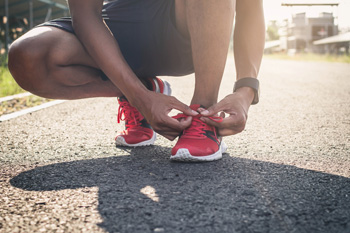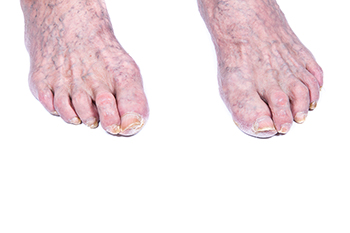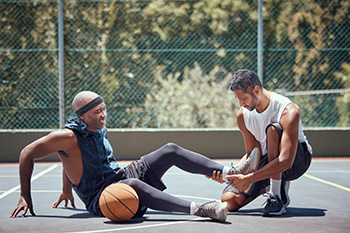Items filtered by date: June 2024
Finding the Right Running Shoes for Your Foot Type

Choosing the right running shoes based on your foot type and running style is critical for comfort and injury prevention. For pronated feet, where the foot rolls inward excessively, stability or motion-control shoes provide the necessary support. Neutral runners, whose feet roll inward slightly, benefit from neutral cushioning shoes that offer balanced support. Supinated feet, which roll outward, require shoes with extra cushioning to absorb impact. Arch level is another consideration. High arches need cushioned shoes for shock absorption, while low arches benefit from stability shoes. Heel strikers, who land on their heels, should look for shoes with ample heel cushioning. Additionally, midfoot and forefoot strikers need shoes with cushioning in the midfoot and forefoot areas. Runners can experience foot injuries from wearing shoes that do not fit their running needs. If this applies to you, it is suggested that you consult a podiatrist who can treat any foot condition, and guide you on how to choose the right running shoes for you.
You should always make sure your running shoes fit properly in order to avoid injury. For more information, contact one of our podiatrists from Quad Cities Foot and Ankle Associates. Our doctors can provide the care you need to keep you pain-free and on your feet.
Choosing the Right Running Shoe for Your Foot Type
Improper shoe sizing can cause a myriad of problems for your feet. Shoes that don’t fit you properly can lead to muscular imbalances in your body, which can result in foot, knee, and hip injuries.
Tips for Finding the Right Running Shoe
- Make sure you have a thumb’s width of wiggle room between the end of your longest toe and the front of the shoe.
- There should be little to no slipping at the heel
- Don’t assume your size in one shoe brand will be your size in another
- Do not lace up your shoes too tightly
- Walk around in the store with your new shoes before you buy them
If you have any questions please feel free to contact our our offices located in Bettendorf, and DeWitt, IA and Rock Island, IL . We offer the newest diagnostic and treatment technologies for all your foot and ankle needs.
Effective Foot Care Tips for Seniors

Maintaining good foot health is essential for seniors to ensure mobility and overall well-being. Regular foot care includes keeping feet clean and dry, which helps prevent infections. Moisturizing daily can prevent dry, cracked skin, while avoiding areas between the toes to reduce fungal growth. Wearing well-fitted, supportive shoes can prevent discomfort and reduce the risk of falls. It is also important to inspect feet regularly for any changes such as sores, redness, or swelling, and to address issues promptly. Trimming toenails straight across helps prevent ingrown nails, while gentle foot exercises can improve circulation and flexibility. Consulting a podiatrist for any persistent foot problems ensures appropriate treatment and care. If you have foot pain or are caring for an elderly person, it is suggested that you confer with this type of doctor who can effectively offer relief options, in addition to individualized foot care tips.
Proper foot care is something many older adults forget to consider. If you have any concerns about your feet and ankles, contact one of our podiatrists from Quad Cities Foot and Ankle Associates. Our doctors can provide the care you need to keep you pain-free and on your feet.
The Elderly and Their Feet
As we age we start to notice many changes in our body, but the elder population may not notice them right away. Medical conditions may prevent the elderly to take notice of their foot health right away. Poor vision is a lead contributor to not taking action for the elderly.
Common Conditions
- Neuropathy – can reduce feeling in the feet and can hide many life-threatening medical conditions.
- Reduced flexibility – prevents the ability of proper toenail trimming, and foot cleaning. If left untreated, it may lead to further medical issues.
- Foot sores – amongst the older population can be serious before they are discovered. Some of the problematic conditions they may face are:
- Gouging toenails affecting nearby toe
- Shoes that don’t fit properly
- Pressure sores
- Loss of circulation in legs & feet
- Edema & swelling of feet and ankles
Susceptible Infections
Diabetes and poor circulation can cause general loss of sensitivity over the years, turning a simple cut into a serious issue.
If you have any questions please feel free to contact our offices located in Bettendorf, and DeWitt, IA and Rock Island, IL . We offer the newest diagnostic and treatment technologies for all your foot and ankle needs.
Are Bunions Affecting Your Everyday Life?
Difference Between Corns and Calluses
 Corns and calluses are common foot conditions that are often confused but have distinct differences. Corns are small, rounded areas of thickened skin that usually develop on bony areas like the top or sides of toes as a result of pressure or friction. Corns often develop from the consistent friction with ill-fitted shoes. Typically, corns have a hard core surrounded by inflamed skin that may cause discomfort or pain when pressure is applied. Calluses, on the other hand, are broader, more diffused areas of thickened skin that typically form on the soles of the feet or the palms of the hands. Calluses form as the body's way of protecting itself from ongoing rubbing or pressure from everyday activities like walking, working, or any kind of manual labor. Unlike corns, calluses generally do not cause pain but they may affect mobility if they grow too thick. Regular foot care and attention to shoe fit can help maintain healthy feet and prevent the development of these agitating conditions. If you suffer from persistent or painful corns and calluses, it is suggested that you visit a podiatrist for a proper evaluation and appropriate treatment recommendations.
Corns and calluses are common foot conditions that are often confused but have distinct differences. Corns are small, rounded areas of thickened skin that usually develop on bony areas like the top or sides of toes as a result of pressure or friction. Corns often develop from the consistent friction with ill-fitted shoes. Typically, corns have a hard core surrounded by inflamed skin that may cause discomfort or pain when pressure is applied. Calluses, on the other hand, are broader, more diffused areas of thickened skin that typically form on the soles of the feet or the palms of the hands. Calluses form as the body's way of protecting itself from ongoing rubbing or pressure from everyday activities like walking, working, or any kind of manual labor. Unlike corns, calluses generally do not cause pain but they may affect mobility if they grow too thick. Regular foot care and attention to shoe fit can help maintain healthy feet and prevent the development of these agitating conditions. If you suffer from persistent or painful corns and calluses, it is suggested that you visit a podiatrist for a proper evaluation and appropriate treatment recommendations.
Corns can make walking very painful and should be treated immediately. If you have questions regarding your feet and ankles, contact one of our podiatrists of Quad Cities Foot and Ankle Associates. Our doctors will treat your foot and ankle needs.
Corns: What Are They? And How Do You Get Rid of Them?
Corns are thickened areas on the skin that can become painful. They are caused by excessive pressure and friction on the skin. Corns press into the deeper layers of the skin and are usually round in shape.
Ways to Prevent Corns
There are many ways to get rid of painful corns such as:
- Wearing properly fitting shoes that have been measured by a professional
- Wearing shoes that are not sharply pointed or have high heels
- Wearing only shoes that offer support
Treating Corns
Although most corns slowly disappear when the friction or pressure stops, this isn’t always the case. Consult with your podiatrist to determine the best treatment option for your case of corns.
If you have any questions please feel free to contact our offices located in Bettendorf, and DeWitt, IA and Rock Island, IL . We offer the newest diagnostic and treatment technologies for all your foot and ankle needs.
Basketball Players and Achilles Tendon Injuries

For basketball players, the Achilles tendon stands as a vital yet vulnerable component of their anatomy, often susceptible to injury due to the demands of the sport. The explosive movements, sudden changes in direction, and repetitive jumping place significant stress on this tendon, increasing the risk of strain or rupture. To prevent such injuries, athletes must prioritize proper conditioning and strengthening exercises, focusing on calf muscles and Achilles tendon flexibility. Incorporating dynamic warm-up routines and gradual progression in training intensity can also lower the risk of tendon overuse. Footwear plays a pivotal role, with supportive basketball shoes providing stability and shock absorption to lessen the strain on the Achilles tendon. Maintaining adequate hydration and nutrition aids in tissue health and recovery, further reducing the likelihood of tendon injuries. If you are a basketball athlete or a weekend warrior and have endured an Achilles tendon injury, it is suggested that you consult a podiatrist who can determine the right treatment for you.
Achilles tendon injuries need immediate attention to avoid future complications. If you have any concerns, contact one of our podiatrists of Quad Cities Foot and Ankle Associates. Our doctors can provide the care you need to keep you pain-free and on your feet.
What Is the Achilles Tendon?
The Achilles tendon is a tendon that connects the lower leg muscles and calf to the heel of the foot. It is the strongest tendon in the human body and is essential for making movement possible. Because this tendon is such an integral part of the body, any injuries to it can create immense difficulties and should immediately be presented to a doctor.
What Are the Symptoms of an Achilles Tendon Injury?
There are various types of injuries that can affect the Achilles tendon. The two most common injuries are Achilles tendinitis and ruptures of the tendon.
Achilles Tendinitis Symptoms
- Inflammation
- Dull to severe pain
- Increased blood flow to the tendon
- Thickening of the tendon
Rupture Symptoms
- Extreme pain and swelling in the foot
- Total immobility
Treatment and Prevention
Achilles tendon injuries are diagnosed by a thorough physical evaluation, which can include an MRI. Treatment involves rest, physical therapy, and in some cases, surgery. However, various preventative measures can be taken to avoid these injuries, such as:
- Thorough stretching of the tendon before and after exercise
- Strengthening exercises like calf raises, squats, leg curls, leg extensions, leg raises, lunges, and leg presses
If you have any questions please feel free to contact our offices located in Bettendorf, and DeWitt, IA and Rock Island, IL . We offer the newest diagnostic tools and technology to treat your foot and ankle needs.

